This is my 24th annual message for Martin Luther King Jr. Day. The tradition started in 2002 as an internal message at my law firm about the MLK holiday. The recipients expanded to friends and family, and in 2016, the message moved to Hot Stove. I will return to baseball in my next post – spring training is just four weeks away – but for now, please enjoy the genius of Stevie Wonder in honor of Martin Luther King’s birthday anniversary (tomorrow, January 15) and the MLK holiday (next Monday, January 20).
Roadblocks to MLK Holiday (1968-1979): Four days after Martin Luther King Jr. was assassinated in 1968, Congressman John Conyers Jr. submitted a bill to make King’s birthday a national holiday. Conyers resubmitted the bill each year over the next decade, but it continued to languish without even being brought to a vote.
There was some hope in 1979. On January 14, President Jimmy Carter called upon Congress to act on the bill, and the House did so in November. But the legislation fell short by five votes.
Before Carter left office, he protected a major piece of history by designating King’s birth home and neighborhood (including his church) as a national historic site. Below, Carter with Coretta Scott King, Martin Luther King Sr. (“Daddy King”) and Andrew Young at the Ebeneezer Baptist Church.
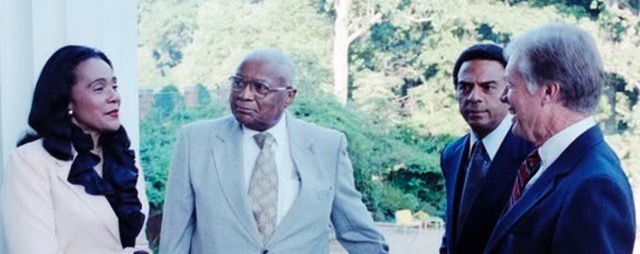
1980 – Stevie Wonder’s Song: Stevie Wonder had long been an advocate for a King holiday. In 1979, he shared a dream with Coretta Scott King, saying “I imagined in this dream I was doing this song. We were marching with petition signs to make Dr. King’s birthday a national holiday.”
A year later, Wonder took a big step to make his dream a reality. In September of 1980, he released a new album, Hotter than July. The inside sleeve for the record featured a photo of King and a tribute that ended with a plea from Wonder: “I and a great number of people believe that it is time for our country to adopt legislation that will make January 15, Martin Luther King’s birthday, a national holiday, both in recognition of what he achieved and as a reminder of the distance still to be traveled.”
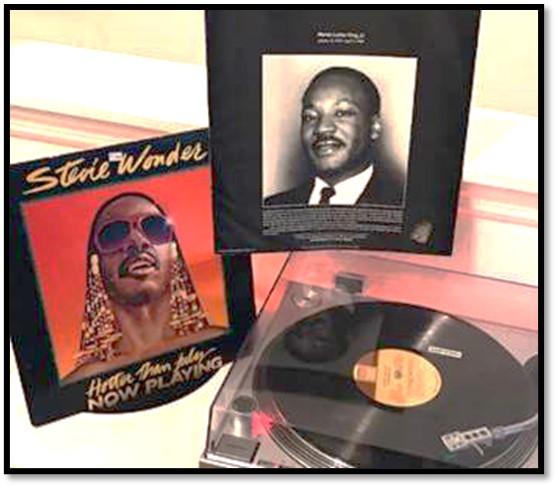
The final cut on the album was “Happy Birthday,” a new song written by Wonder that started with these lyrics…
You know it doesn’t make much sense
There ought to be a law against
Anyone who takes offense
At a day in your celebration ‘cause we all know in our minds
That there ought to be a time
That we can set aside
To show just how much we love you
And I’m sure you would agree
What could fit more perfectly
Than to have a world party on the day you came to be
Although the lyrics are serious, the delivery is upbeat and buoyant, and the chorus is made for handclapping, weaving and singing along. More on that below in Lonnie’s Jukebox.
The song became an anthem in the movement for the holiday. As explained by Wonder, “I am not political. I am not a leader. I am a human being given the honor and gift of song. And with that, I give the best possible.”
1980/1981 Tour and Rally: In August of 1980, just before release of the album, Wonder was interviewed by Barbara Walters on 20/20 . He played his “Happy Birthday” on the keyboards and announced that he would be embarking on a four-month tour to promote Hotter Than July (back of album shown below). His goal was more than just selling records. It was to be a massive publicity campaign for the King holiday.
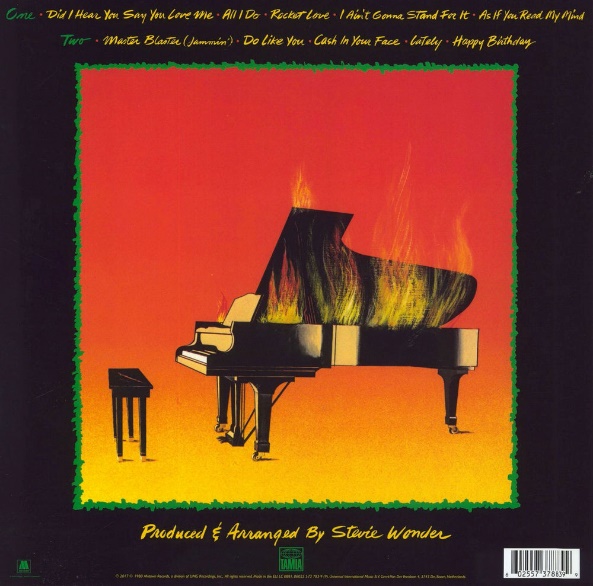
Bob Marley was scheduled to be part of the tour, but tragically Marley was hospitalized with the cancer that would take his life months later. Marley’s place was taken by the politically conscious singer/poet Gil Scott-Heron, known for his poem The Revolution Will Not Be Televised and his spoken-word performances that influenced rap music. Scott-Heron later wrote a book about the tour (The Last Holiday), marveling at the work of Stevie Wonder as entertainer, organizer and humanitarian.
Scott-Heron and his band were the opening act, and he would join Wonder at the end of the concert for a rousing encore of “Happy Birthday.” Scott-Heron was also part of a big night at Madison Square Garden when Michael Jackson came out of the audience to join him and Wonder to sing “Master Blaster, the hit single off the album.

In January of 1981, the tour took a break for another item on Wonder’s agenda, a march and rally at the National Mall on King’s birthday anniversary (January 15).
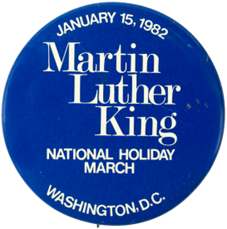
It was Wonder’s idea to have the rally and pay for it with a benefit concert at the Capital Centre the following night. Although it was an icy day, thousands gathered at the National Mall to hear remarks from several civil rights leaders.
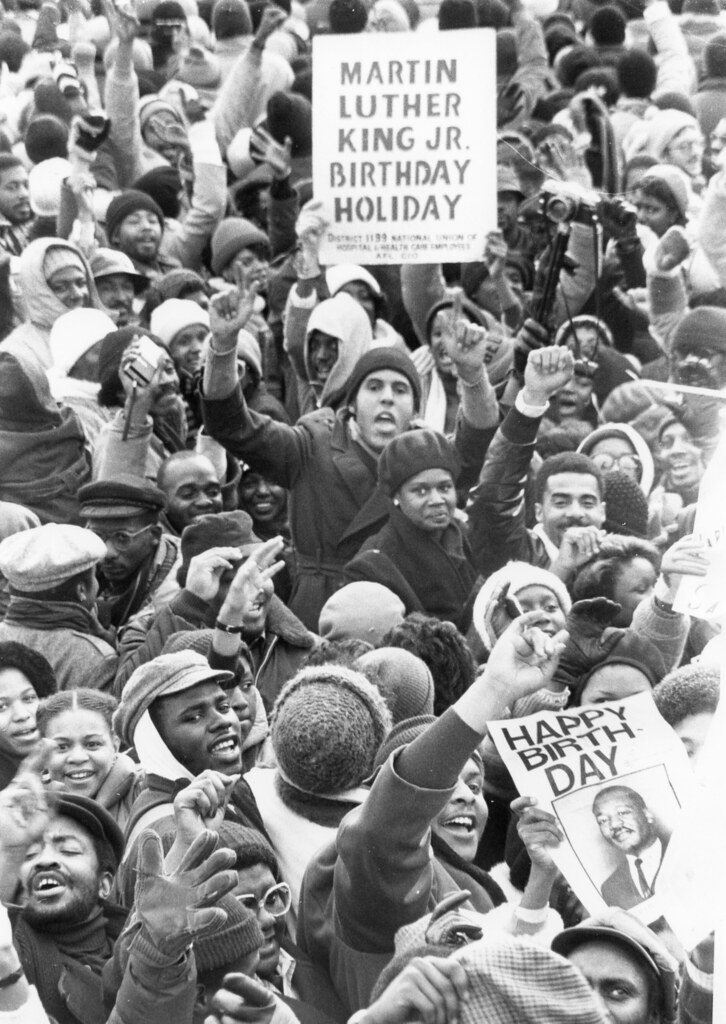
But the draw was Stevie Wonder. With the crowd chanting “Martin Luther King, we took a holiday,” Stevie took the stage…
“It’s fitting that we should gather here, for it was here that Martin Luther King inspired the entire nation and the world with his stirring words, his great vision both challenging and inspiring us with his great dream. People have asked, ‘Why Stevie Wonder, as an artist?’ Why should I be involved in this great cause? I’m Stevie Wonder the artist, yes, but I’m Steveland Morris, a man, a citizen of this country, and a human being. As an artist, my purpose is to communicate the message that can better improve the lives of us all.”
Wonder was joined on stage by Gil Scott-Heron and music legends Diana Ross and Gladys Knight to sing Wonder’s “Happy Birthday.”
Below, at the press conference for the rally, Wonder with Jesse Jackson and Gladys Knight.
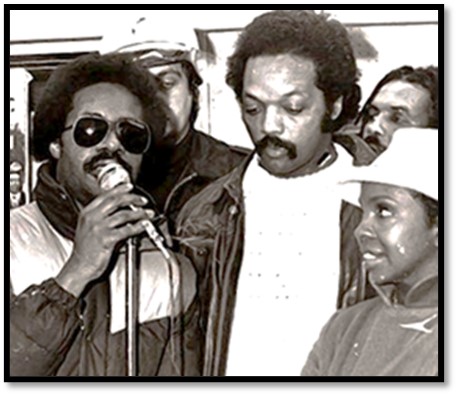
The rally was held five days before the Inauguration of President Ronald Reagan. The new president was not a supporter of a King holiday. But Stevie Wonder and other leaders in the cause were not deterred.
I just never understood
How a man who died for good
Could not have a day that would
Be set aside for his recognition.
1982/1983 – Perseverance: Wonder financed the opening of a lobbying office in Washington. He continued to spread the message in musical appearances and alongside Coretta Scott King at rallies. Below, King and Wonder at an MLK gala in Atlanta in 1982.
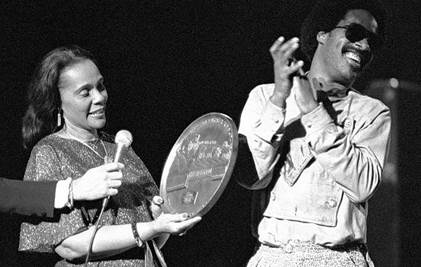
There was momentum. Labor unions and the Congressional Black Caucus were instrumental in applying pressure. In February of 1982, Wonder and Coretta Scott King testified before Congress and presented a petition bearing more than six million signatures of support.
Why has there never been a holiday
Where peace is celebrated
All throughout the world
On King’s birthday in 1983, Wonder spent the day at a special legislative hearing on the bill.
The time is overdue
For people like me and you
Who know the way to truth
Is love and unity to all God’s children
The perseverance began to pay off. On August 2, 1983, the House voted 338-90 to pass the bill. The Senate was going to be tougher, and a filibuster loomed.
In a nice bit of timing, a March on Washington had already been organized to celebrate the 20th anniversary of the March on Washington in 1963. Some 250,000 people came to D.C. for the event held where Martin Luther King Jr. made his “I Have a Dream” speech.
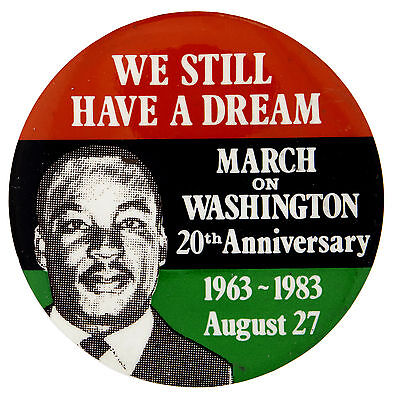
After remarks from several dignitaries, Stevie of course led the crowd in “Happy Birthday.”
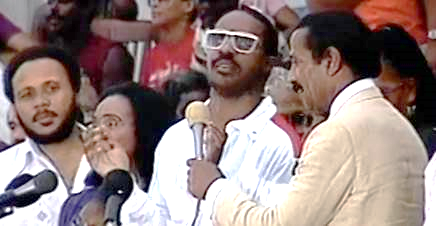
On October 19, 1983, after Jesse Helms’ infamous 16-day filibuster, The Senate passed the bill 79-22. After the Senate approval, President Reagan again stated his opposition to the holiday, “But since they seem bent on making it a national holiday, I believe the symbolism of that day’s important enough that I’ll sign the legislation when it reaches my desk.” Veto-proof majorities in the House and Senate may have been persuasive.
The signing ceremony in the Rose Garden was on November 2, 1983. Stevie Wonder was among the guests.
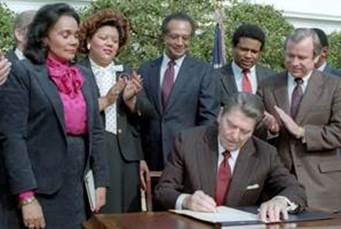
Wonder told Rolling Stone, “I had a vision of the Martin Luther King birthday as a national holiday. I mean, I saw that. I imagined it. I wrote it because I imagined it and I saw it and I believed it. So, I just kept that in my mind until it happened.”
1986 – The First Official MLK Holiday: The legislation provided that the first official MLK holiday would be in 1986. The third Monday in January that year was January 20, 1986.
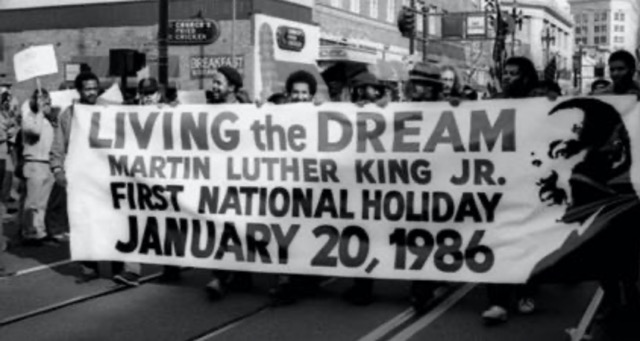
It should be a great event
And the whole day should be spent
In full remembrance
Of those who lived and died for the oneness of all people
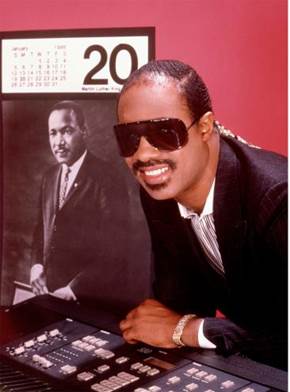
On the evening of January 20, Wonder produced three simultaneous celebrations: (i) Kennedy Center in Washington D.C., (ii) Radio City Music Hall in New York, and (iii) Civic Center in Atlanta. All were of course joyful, basking in the delight of being part of the first official Martin Luther King Jr. Day.
At the Kennedy Center event, Wonder hosted a huge number of celebrities and musical artists. To end the evening, Wonder and Diana Ross introduced the maestro for the final performance, the great Quincy Jones. And then Wonder and dozens of singers – and the crowd – erupted into Wonder’s “Happy Birthday.” Check out the video in Lonnie’s Jukebox.
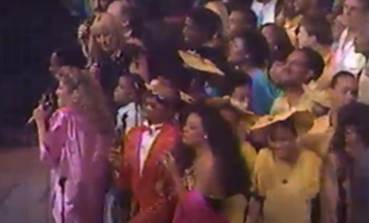
We all know everything
That he stood for time will bring
For in peace our hearts will sing
Thanks to Martin Luther King
Lonnie’s Jukebox – Stevie Wonder Edition: Wonder’s music catalog covers six decades. He’s had 11 Top 10 albums. He’s had 45 Top 40 singles, and 28 of those made it to the Top 10. And 10 made it to #1. Many of his compositions relate to love, civil rights and unity. Here’s a small sampling…
“Happy Birthday” – As originally recorded on the album Hotter Than July (1980).
“Happy Birthday” – Live at the Kennedy Center on January 20, 1986, the first Martin Luther King Jr. Day. See how many celebrities you can name (hint, these two are Bob Dylan and Elizabeth Taylor).
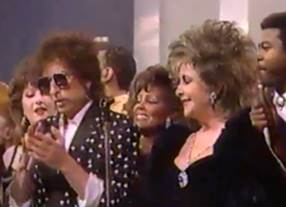
“Blowin’ In the Wind” – “Happy Birthday” was not Stevie Wonder’s first civil rights song. In 1966, at the age of 16, he covered Bob Dylan’s classic that posed the question “How many years can some people exist/Before they’re allowed to be free?”. Stevie’s record was a #1 R&B hit and went to #9 on the pop chart. Dylan’s song had first been popularized by Peter, Paul and Mary who took it to #2 in 1963. At the Kennedy Center show in 1986, all five performers joined in the song (click here and go to the 3:45 mark).
![Bob Dylan, Peter, Paul and Mary, and Stevie Wonder performing “Blowin' in the Wind” , Kennedy Center, Washington, D.C., January 20, 1986 - the first Martin Luther King, Jr. day [1440x985] : r/HistoryPorn](https://lonniesjukebox.com/wp-content/uploads/2025/01/bob-dylan-peter-paul-and-mary-and-stevie-wonder.jpeg)
“We Are the World” – Wonder helped organize and provided creative input for this 1985 charity single recorded to raise funds for African famine relief. Last year, the making of that record was the subject of a new documentary, The Greatest Night in Pop (trailer here; it’s a treat to see the interaction of so many music greats).
The movie has a fun Wonder/Dylan moment when Dylan is having difficulty with the delivery of his solo part (“there’s a choice we’re making, we’re saving our own lives”). So, Stevie Wonder sits at the piano and sings the part imitating Dylan, who learns it by imitating Wonder. Below, the two singers with producer Quincy Jones.
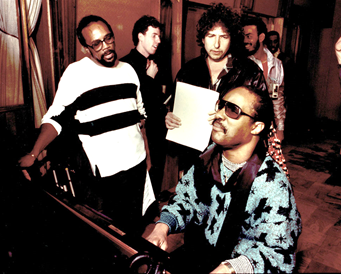
“That’s What Friends Are For” – This song was written by Burt Bacharach and Carole Bayer Sager and was recorded by Dionne Warwick, Elton John, Gladys Knight and Stevie Wonder to raise funds for AIDS research. It became the #1 Billboard single for 1986 and raised $3 million. Stevie excels, as always, on the harmonica (he also plays the superb harmonica solo on Elton John’s “I Guess That’s Why They Call It the Blues”).
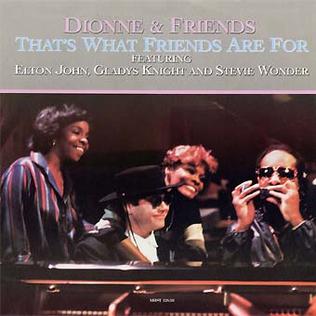
“Signed, Sealed, Delivered (I’m Yours)” – Live at the White House when Stevie Wonder was awarded the 2009 Gershwin Prize (a bonus track in the link, Stevie’s “Superstition”). In the 2008 election, this song was often used at the end of Barack Obama’s speeches and was a presence at many campaign events. Wonder performed the song live at the 2008 Democratic convention. In 2014, Obama awarded the Presidential Medal of Freedom to his “music hero.”
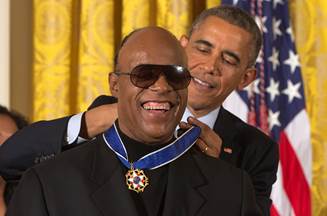
Obama: “I think it’s fair to say that had I not been a Stevie Wonder fan, Michelle might not have dated me. We might not have married. The fact that we agreed on Stevie was part of the essence of our courtship.”
“Ebony and Ivory” – Songwriter Paul McCartney took the well-known metaphor of white and black piano keys symbolizing racial harmony and turned it into duet hit with Stevie Wonder (#1 the U.S. and U.K.). The link is to the two artists singing the song at the White House in 2010 when McCartney received the Gershwin Prize.
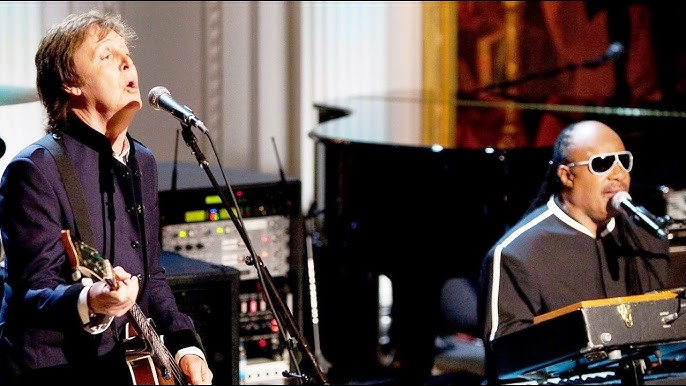
“I Just Called to Say I Love You” – This song won the Academy Award for best original song in 1984 (from the movie The Woman in Red). Upon accepting the Oscar, Wonder dedicated the award to Nelson Mandela who was in prison. South Africa retaliated by banning his music. Wonder sang the song at the anti-apartheid concert in 1988 at Wembley Stadium in London (billed as a 70th birthday celebration for the jailed Mandela). The concert was televised to 67 countries and had a TV audience of 600 million.
Mandela was freed from prison in 1990 and elected president in 1994. When Mandela turned 80 in 1998, Stevie Wonder was in Johannesburg to sing his “Happy Birthday” at the president’s birthday concert.
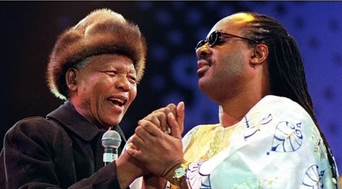
“Fingertips” and “Can We Fix Our Nation’s Broken Heart” – I’m pairing these songs to show how long we have had the gift of Stevie Wonder. In 1963, at age 13, he had a #1 hit with “Fingertips.” Last fall, some 61 years later, he released a poignant new single calling for unity in our divided society.
“You Are the Sunshine of My Life” – I’m ending this playlist with a personal favorite. It’s my message to Rita, but I don’t sing it. Can’t carry a tune, so I’ll rely on Stevie.
A closing quote from Stevie Wonder…
“Dr. King has left an unfinished symphony, which we must complete.”
This reminds me of what Stevie wrote for the record sleeve in his album Hotter Than July. A holiday for Martin Luther King Jr. has two purposes: “Recognition of what he achieved and as a reminder of the distance still to be traveled.”
A good message for all of us as we celebrate the holiday next Monday.